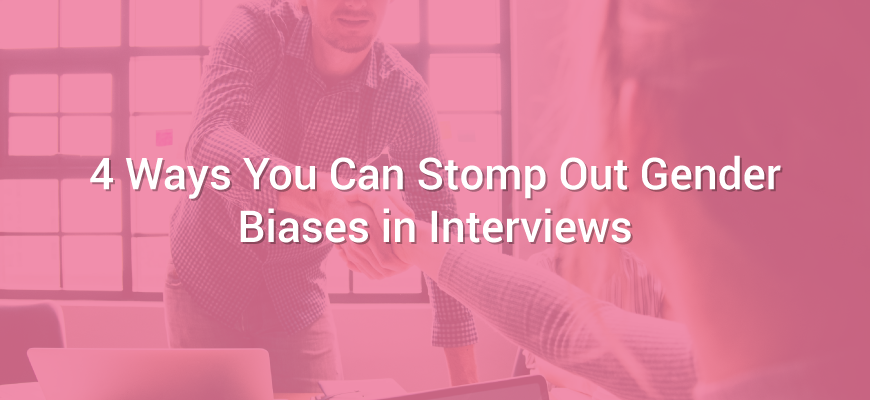“Inherent biases exist.”
As much as everyone hates to admit we often allow biases to dictate our decisions, Mary Pharris, Director of Business Development and Partnerships at Fairygodboss — a marketplace for professional women looking for jobs, career advice, and the inside scoop on companies — is right. No matter how hard we try to extinguish them, they linger over hiring processes.
In Mary’s experience, she’s found these biases exist particularly around gender, which leads to stereotyping candidates.
“It can definitely affect a recruiter’s ability to place candidates, especially if the recruiter is unaware of his or her biases. By giving in to stereotypes and making assumptions about a candidate based on gender or appearance, recruiters can actually miss rockstar candidates.”
For example, only 15 percent of hiring professionals would consider hiring a frowning woman, according to a recent report by Fairygodboss. Along with their demeanor, the report also found women are judged on their weight, age, and race.
Even though these gender biases remain in the interview process and can present hiring challenges, there are a number of ways your team can combat them:
1. Conduct bias training
It seems counterproductive to highlight biases when you’re trying to get rid of them. However, Pharris says, “Training and education around inherent biases, and how to overcome them, is essential in making the best possible hiring decisions.”
Take the power away from preconceived notions around gender by participating in unconscious bias awareness training. Use the training to help your team recognize that everyone, including you, has biases.
Explain what unconscious gender biases are prevalent in today’s workforce. Teach your team how to make decisions based solely on qualifications and cultural fit. Use interactive role-play interviews to show your team direct examples and solutions for harmful biases.
Immediately after training, create action-oriented solutions with your team. Discuss what biases you found stick out most during the interview process.
As a group, brainstorm how you will actively address gender biases and increase a feeling of candidate belonging. For example, you can invite more team members to meet candidates to enhance comfortability and accountability for everyone.
Reconvene after interviews to see what’s working and where improvements should be made on an ongoing basis to improve unbiased workplace diversity.
2. Embrace the power to stop and step away
During unconscious bias training, you became familiar with your own biases. While it was likely uncomfortable, you’re now equipped to check yourself during interviews.
When you feel as though you’re judging a candidate based on something as trivial as hairstyle, appearance, or accent, make a mental note. To stop yourself from defaulting to your personal biases, stick to a structured interview process. Have candidates take skill assessments so you can directly see their talent before interviewing.
Keep this list of qualifiers in front of you. However, ask experience questions first during your interviews. This gives candidates the opportunity to break through your initial gender biases and immediately impress you with more personal recounts of their fit and abilities.
3. Get everyone on the same scoring system
You’re looking for a qualified candidate. Someone who will add value to your team and help your company grow. Their gender, age, or ethnicity plays no part in these qualifications.
So, before going into interviews, it’s crucial to review the most important qualifications for the role. Check the list your team made during training and assess each candidate’s skills before noting any personal traits.
Take it one step further by using the list of qualifications to create a scoring chart. Stick to this scorecard to stay on topic and honestly assess each candidates’ skills fit. Distribute this scorecard to anyone you involve in the interview process.
Of course, this won’t be how you make your final, end-all decision. But until it’s time to start looking at a candidate’s personal attributes to determine cultural fit, this will keep you on track and away from gender biases.
4. Call in reinforcements and collaborate using video interviews
Regardless of what is distracting you from making a confident judgement call, there’s no shame in asking a fellow hiring pro for their opinion on a candidate. Video interviews allow you to gain first-hand feedback on the exact same interview. Rather than relying on your notes or witnessing your responses, co-workers can draw their own conclusions.
Don’t fill anyone in on your insecurities before they give you their honest assessment. You don’t want to taint their opinion.
List of all the pros and cons they provide about the candidate and compare this to your initial evaluation. Review the video interview once again and use this list to determine if your biases were getting in the way of making the best hiring decision for your team.
How do you squash gender biases during interviews? Let us know!











